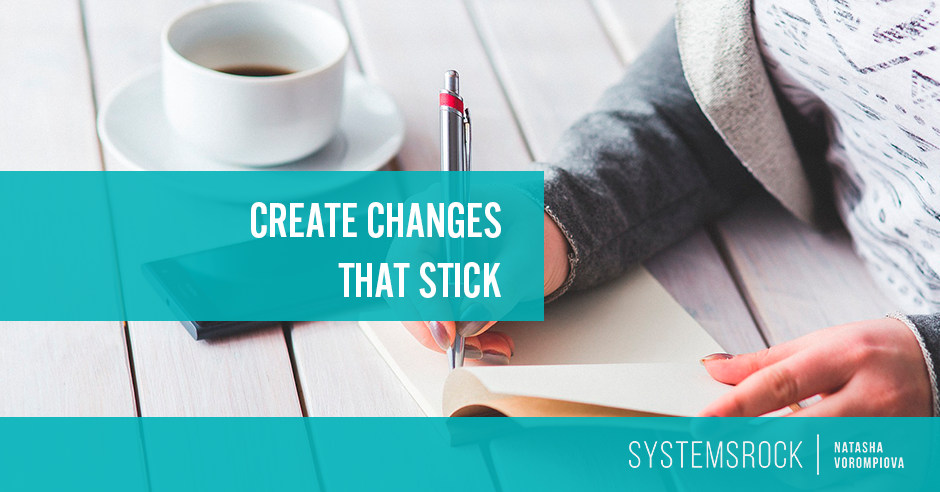Changing anything is hard work – to create change in our business habits is vital for good systemization. Let’s look at how to create changes that stick.
Remember that time you decided you were going to start checking your email only twice a day?
Maybe you kept it up for a week and then were back to checking your inbox more often. Do you check email while in long lines at the grocery store, during your pedicure, or during commercials?
It’s not just you. When we decide to make a change or create a habit, it’s more likely that they’ll revert back to old routines instead of making sustainable change in the long run.
So how can you create habits that permanently stick?
Try taking these three steps to start creating change that lasts.
3 Steps to Create Change that Stick!
1. Take Baby Steps
BJ Fogg, professor of behavior design at Stanford and founder of the Tiny Habits methodology, recommends that you examine the big habit you want to start and identify the baby steps you can take toward it.
You can do this in two ways:
- Try a tinier version – If you wanted to create a habit of doing a weekly review, you could create a tinier version and say that you’re going to ask yourself one question at the end of your workday every Friday. If you wanted to build the habit of reviewing your priorities for the day, you can scale that down to identifying just one priority for the day after you drink your coffee.
- Use a starter step – Some habits aren’t easily scaled down, and when that happens, you can use a starter step, which is essentially an action that will trigger you to do the habit. For example, if you wanted to start taking action on your emails before you close them, your starter step would be to click the “Forward” button, so you can send that email to Asana or Evernote as a task. If you wanted to create the habit of taking breaks outside every couple of hours, your starter step could be putting on your walking shoes.
While it might seem insignificant to take such small steps, it’s actually the most effective way to build a habit that becomes automatic quickly and lasts over a long period of time. In fact, it’s ideal for busy entrepreneurs who can’t imagine adding another task to their to-do lists because it requires very little willpower, if any, to get started and build a routine.
By creating a tinier version of your habit or using a starter step, you can take small, but intentional, actions toward creating a long-lasting change.
2. Change Your Environment
Without realizing it, you and your behavior are heavily influenced by the environment that you’re in.
So if you want to go to sleep earlier in order to create a morning routine for yourself before the kids wake up, but you have a TV in your bedroom, it’s going to be more difficult for you to establish that habit.
On the other hand, if you want to start taking more breaks during your workday outside, and you live next to a park, it’s going to be easier for you to leave your office, walk outside, and feel recharged.
Think of the habits you’re trying to build. Notice your environments — both, literally, like the room you’re in and intangible areas like your network of friends. Look at how they contribute to a habit you want to build or if they are reinforcing your old habits and behaviors.
Jim Bunch, coach and founder of the Ultimate Game of Life, has identified nine different environments, including your physical body and your relationships, that could be “inspiring” or “expiring” you. If you’re curious about the other environments, you can find them here.
By changing your environment, you can surround yourself by a support system that can help you more easily replace your old habits with new productive ones.
3. Trust in Success Momentum
You might be wondering how you eventually get to a place where you write one article a week consistently or automatically take breaks every other hour by taking baby steps.
Here’s the secret.
As you take baby steps and gain more confidence in your ability to accomplish small actions, a wonderful thing happens called success momentum.
You’ll believe that you can do more, and so you will. Quite naturally you’ll begin to ask yourself two questions instead of just one every Friday for your weekly review or free write every morning for ten minutes instead of five.
In order to achieve success momentum, you need to trust in taking baby steps. Once you do, you’ll recognize your increased confidence in change and embrace this new, automatic habit.
Building Habits is a Skill
It’s important to know that the ability to build habits that stick isn’t something gifted to those of us with the most willpower.
On the contrary, it’s a gift to those of us who know how to practice the skill to create change.
You can absolutely build any skill you want by taking baby steps, changing your environment and trusting in success momentum.
Back to You
What business-related habits are you currently trying to build?


